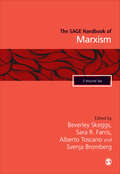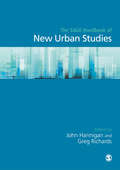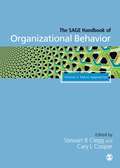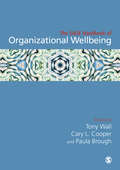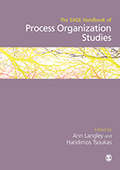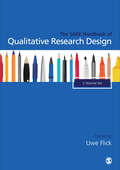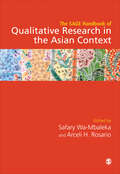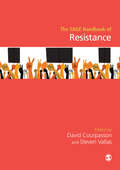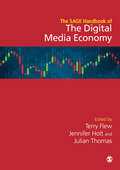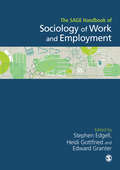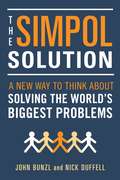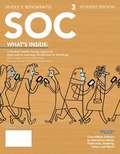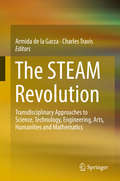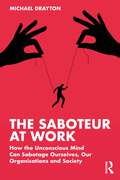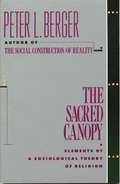- Table View
- List View
The SAGE Handbook of Marxism
by Beverley Skeggs Sara R. Farris Alberto Toscano Svenja BrombergThe past decade has witnessed a resurgence of interest in Marxism both within and without the academy. Marxian frameworks, concepts and categories continue to be narratively relevant to the features and events of contemporary capitalism. Most crucially, an attention to shifting cultural conditions has lead contemporary researchers to re-confront some classical and essential Marxist concepts, as well as elaborating new critical frameworks for the analysis of capitalism today. The SAGE Handbook of Marxism showcases this cutting-edge of today’s Marxism. It advances the debate with essays that rigorously map and renew the concepts that have provided the groundwork and main currents for Marxist theory, and showcases interventions that set the agenda for Marxist research in the 21st century. A rigorous and challenging collection of scholarship, this book contains a stunning range of contributions from contemporary academics, writers and theorists from around the world and across disciplines, invaluable to scholars and graduate students alike. Part 1: Reworking the critique of political economy Part 2: Forms of domination, subjects of struggle Part 3: Political perspectives Part 4: Philosophical dimensions Part 5: Land and existence Part 6: Domains Part 7: Inquiries and debates
The SAGE Handbook of Marxism
by Beverley Skeggs Sara R. Farris Alberto Toscano Svenja BrombergThe past decade has witnessed a resurgence of interest in Marxism both within and without the academy. Marxian frameworks, concepts and categories continue to be narratively relevant to the features and events of contemporary capitalism. Most crucially, an attention to shifting cultural conditions has lead contemporary researchers to re-confront some classical and essential Marxist concepts, as well as elaborating new critical frameworks for the analysis of capitalism today. The SAGE Handbook of Marxism showcases this cutting-edge of today’s Marxism. It advances the debate with essays that rigorously map and renew the concepts that have provided the groundwork and main currents for Marxist theory, and showcases interventions that set the agenda for Marxist research in the 21st century. A rigorous and challenging collection of scholarship, this book contains a stunning range of contributions from contemporary academics, writers and theorists from around the world and across disciplines, invaluable to scholars and graduate students alike. Part 1: Reworking the critique of political economy Part 2: Forms of domination, subjects of struggle Part 3: Political perspectives Part 4: Philosophical dimensions Part 5: Land and existence Part 6: Domains Part 7: Inquiries and debates
The SAGE Handbook of New Urban Studies
by Greg Richards Dr John A. HanniganThe last two decades have been an exciting and richly productive period for debate and academic research on the city. The SAGE Handbook of New Urban Studies offers comprehensive coverage of this modern re-thinking of urban theory, both gathering together the best of what has been achieved so far, and signalling the way to future theoretical insights and empirically grounded research. Featuring many of the top international names in the field, the handbook is divided into nine key sections: SECTION 1: THE GLOBALIZED CITY SECTION 2: URBAN ENTREPRENEURIALISM, BRANDING, GOVERNANCE SECTION 3: MARGINALITY, RISK AND RESILIENCE SECTION 4: SUBURBS AND SUBURBANIZATION: STRATIFICATION, SPRAWL, SUSTAINABILITY SECTION 5: DISTINCTIVE AND VISIBLE CITIES SECTION 6: CREATIVE CITIES SECTION 7: URBANIZATION, URBANITY AND URBAN LIFESTYLES SECTION 8: NEW DIRECTIONS IN URBAN THEORY SECTION 9: URBAN FUTURES This is a central resource for researchers and students of Sociology, Cultural Geography and Urban Studies.
The SAGE Handbook of New Urban Studies
by Greg Richards Dr John A. HanniganThe last two decades have been an exciting and richly productive period for debate and academic research on the city. The SAGE Handbook of New Urban Studies offers comprehensive coverage of this modern re-thinking of urban theory, both gathering together the best of what has been achieved so far, and signalling the way to future theoretical insights and empirically grounded research. Featuring many of the top international names in the field, the handbook is divided into nine key sections: SECTION 1: THE GLOBALIZED CITY SECTION 2: URBAN ENTREPRENEURIALISM, BRANDING, GOVERNANCE SECTION 3: MARGINALITY, RISK AND RESILIENCE SECTION 4: SUBURBS AND SUBURBANIZATION: STRATIFICATION, SPRAWL, SUSTAINABILITY SECTION 5: DISTINCTIVE AND VISIBLE CITIES SECTION 6: CREATIVE CITIES SECTION 7: URBANIZATION, URBANITY AND URBAN LIFESTYLES SECTION 8: NEW DIRECTIONS IN URBAN THEORY SECTION 9: URBAN FUTURES This is a central resource for researchers and students of Sociology, Cultural Geography and Urban Studies.
The SAGE Handbook of Organizational Behavior: Volume Two: Macro Approaches
by Stewart R Clegg Professor Cary L Cooper`The Sage Handbook of Organizational Behaviour is a fine addition to past works of reference in the field, edited by two prominent scholars who are internationally known. Its approach is both critical and original in many incisive ways, aspiring to a cutting-edge coverage of the core and periphery of OB. Many of the chapter authors stick their necks out and avoid the more obvious, conventional expositions of their topic. It covers a wide range of topics of potential use to both undergraduate and postgraduate students of the subject, as well as academics, researchers and practitioners. It will be of particular interest to those on MBA and DBA courses. It can be strongly recommended as an essential faculty library purchase, as well as a useful tool for individuals interested in having such a guide to the subject at hand' - Professor Malcolm Warner, Emeritus Fellow, Wolfson College and Judge Business School, University of Cambridge `This important new Handbook brings together for the first time a collection of major contributions on macro-organizational behaviour. This area of study is concerned with the ways in which the people who inhabit organizations make sense of their situations, contributing to the distinctive character of those organizations through their actions and struggles. The conventional literature, artificially divided between micro organizational behaviour and organization theory, has under-explored this obvious conjunction between people and organizations. Stewart Clegg and Cary Cooper perform a great service in helping to make good the deficiency' - John Child, Professor of Commerce, Birmingham Business School `Thorough and comprehensive. Thoughtful critique and new insights' - Chris Argyris, James B. Conant Professor, Emeritus, Harvard University In this second volume of The SAGE Handbook of Organizational Behavior, the focus is on macro-organizational behavior, revealing ways in which the person and group affect the organization. Chapters are written by eminent and upcoming scholars in the field, each presenting on the major issues in organizational behavior as seen with a macro-lens. The Handbook is divided into three parts, the first introducing and framing the field; the second part considering the various organizational processes involved, including learning, teamwork, identity and power, among others, while finally Part Three introduces organizing on a macro-scale, covering topics such as organizational change, design governance and globalization. The SAGE Handbook of Organizational Behavior: Macro Approaches is an essential resource for researchers and students across management and organization studies.
The SAGE Handbook of Organizational Wellbeing
by Cary L. Cooper Tony Wall Paula BroughThe SAGE Handbook of Organizational Wellbeing is a comprehensive and cutting-edge work providing the latest insights into a range of perspectives on organizational wellbeing, as well as highlighting global wellbeing issues and exploring new contexts. Topics covered include: digital working and social media, LGBTQIA+ identifications and work, suicide at work, refugee workers, and mental health. A multi- and inter-disciplinary work, this handbook embraces ideas and empirical work from a range of fields including psychology, business and management, economics, and science. This handbook draws together current knowledge whilst also outlining emerging issues and directions, making this an invaluable resource for students and researchers spanning a wide array of disciplines. Part 1: Theoretical Perspectives Part 2: International Issues and Contexts Part 3: Developing Organizational Wellbeing Part 4: Emerging Issues and Directions
The SAGE Handbook of Organizational Wellbeing
by Cary L. Cooper Tony Wall Paula BroughThe SAGE Handbook of Organizational Wellbeing is a comprehensive and cutting-edge work providing the latest insights into a range of perspectives on organizational wellbeing, as well as highlighting global wellbeing issues and exploring new contexts. Topics covered include: digital working and social media, LGBTQIA+ identifications and work, suicide at work, refugee workers, and mental health. A multi- and inter-disciplinary work, this handbook embraces ideas and empirical work from a range of fields including psychology, business and management, economics, and science. This handbook draws together current knowledge whilst also outlining emerging issues and directions, making this an invaluable resource for students and researchers spanning a wide array of disciplines. Part 1: Theoretical Perspectives Part 2: International Issues and Contexts Part 3: Developing Organizational Wellbeing Part 4: Emerging Issues and Directions
The SAGE Handbook of Process Organization Studies
by Ann Langley Haridimos TsoukasThe SAGE Handbook of Process Organization Studies provides a comprehensive and timely overview of the field. This volume offers a compendium of perspectives on process thinking, process organizational theory, process research methodology and empirical applications. The emphasis is on a combination of pedagogical contributions and in-depth reviews of current thinking and research in each of the selected areas, combined with the development of agendas for future research. The Handbook is divided into five sections: Part One: Process Philosophy Part Two: Process Theory Part Three: Process Methodology Part Four: Process Applications Part Five: Process Perspectives
The SAGE Handbook of Process Organization Studies
by Ann Langley Haridimos TsoukasThe SAGE Handbook of Process Organization Studies provides a comprehensive and timely overview of the field. This volume offers a compendium of perspectives on process thinking, process organizational theory, process research methodology and empirical applications. The emphasis is on a combination of pedagogical contributions and in-depth reviews of current thinking and research in each of the selected areas, combined with the development of agendas for future research. The Handbook is divided into five sections: Part One: Process Philosophy Part Two: Process Theory Part Three: Process Methodology Part Four: Process Applications Part Five: Process Perspectives
The SAGE Handbook of Qualitative Research Design
by Uwe FlickQualitative research design is continually evolving. It is not only more established in disciplines beyond the traditional social sciences in which it is a standard choice, but also just as impacted by the changes in what data, technologies, and approaches researchers are using. This Handbook takes readers through the foundational theories, functions, strategies, and approaches to qualitative research design, before showcasing how it negotiates different data and research environments and produces credible, actionable impact beyond the study. Containing contributions from over 90 top scholars from a range of social science disciplines, this Handbook is not just an anthology of different qualitative research designs and how/when to use them; it is a complete exploration of how and why these designs are shaped and how, why, and into what they are evolving. This is a valuable resource for Master’s and PhD level students, faculty members, and researchers across a wide range of disciplines such as health, nursing, psychology, social work, sociology, and education. Volume One: Part I: Concepts of Designing Designs in Qualitative Research Part 2: Theories and Epistemological Contexts of Designing Qualitative Research Part 3: Elements of Designing Qualitative Research Part 4: Basic Designs and Research Strategies in Qualitative Research Part 5: Mixing Methods in Designing Qualitative Research Volume Two: Part 6: Designing Qualitative Research for Specific Kinds of Data Part 7: Designing Qualitative Online and Multimodal Research Part 8: Designing Qualitative Research for Specific Groups and Areas Part 9: Designing Qualitative Research in Disciplinary Fields Part 10: Designing Qualitative Research for Impact
The SAGE Handbook of Qualitative Research Design
by Uwe FlickQualitative research design is continually evolving. It is not only more established in disciplines beyond the traditional social sciences in which it is a standard choice, but also just as impacted by the changes in what data, technologies, and approaches researchers are using. This Handbook takes readers through the foundational theories, functions, strategies, and approaches to qualitative research design, before showcasing how it negotiates different data and research environments and produces credible, actionable impact beyond the study. Containing contributions from over 90 top scholars from a range of social science disciplines, this Handbook is not just an anthology of different qualitative research designs and how/when to use them; it is a complete exploration of how and why these designs are shaped and how, why, and into what they are evolving. This is a valuable resource for Master’s and PhD level students, faculty members, and researchers across a wide range of disciplines such as health, nursing, psychology, social work, sociology, and education. Volume One: Part I: Concepts of Designing Designs in Qualitative Research Part 2: Theories and Epistemological Contexts of Designing Qualitative Research Part 3: Elements of Designing Qualitative Research Part 4: Basic Designs and Research Strategies in Qualitative Research Part 5: Mixing Methods in Designing Qualitative Research Volume Two: Part 6: Designing Qualitative Research for Specific Kinds of Data Part 7: Designing Qualitative Online and Multimodal Research Part 8: Designing Qualitative Research for Specific Groups and Areas Part 9: Designing Qualitative Research in Disciplinary Fields Part 10: Designing Qualitative Research for Impact
The SAGE Handbook of Qualitative Research in the Asian Context
by Safary Wa-Mbaleka Arceli H. RosarioQualitative research is growing in Asia and globally. In an Asian context, this requires an awareness of a completely different set of norms, practices, and expectations than those covered by books from a western perspective. This handbook truly celebrates these differences. Spanning the full research process, from philosophy and ethics to design and methods and through data collection, management, analysis, and dissemination, it focuses specifically on the practicalities needed to conduct effective and culturally responsive research in the Asian context. This handbook extends beyond researchers actually in Asia and also speaks to researchers working with Asian participants, researching in Asian immigrant neighbourhoods, and studying the larger global topics like socioeconomic challenges, climate change, or technological advancement. This is the first book to focus specifically on qualitative research in the Asian context and includes diverse contributors from Asia such as the Philippines, Singapore, Thailand, India, Oman, China, South Korea, Indonesia, Kazakhstan, Hong Kong, and from other continents such as North America, South America, Africa, Europe, and Oceania. Section 1: Foundations of Qualitative Research in Asia Section 2: Qualitative Research Designs Section 3: Best Practices in Dealing with Qualitative Research Data Section 4: Other Qualitative Research Topics
The SAGE Handbook of Qualitative Research in the Asian Context
by Safary Wa-Mbaleka Arceli H. RosarioQualitative research is growing in Asia and globally. In an Asian context, this requires an awareness of a completely different set of norms, practices, and expectations than those covered by books from a western perspective. This handbook truly celebrates these differences. Spanning the full research process, from philosophy and ethics to design and methods and through data collection, management, analysis, and dissemination, it focuses specifically on the practicalities needed to conduct effective and culturally responsive research in the Asian context. This handbook extends beyond researchers actually in Asia and also speaks to researchers working with Asian participants, researching in Asian immigrant neighbourhoods, and studying the larger global topics like socioeconomic challenges, climate change, or technological advancement. This is the first book to focus specifically on qualitative research in the Asian context and includes diverse contributors from Asia such as the Philippines, Singapore, Thailand, India, Oman, China, South Korea, Indonesia, Kazakhstan, Hong Kong, and from other continents such as North America, South America, Africa, Europe, and Oceania. Section 1: Foundations of Qualitative Research in Asia Section 2: Qualitative Research Designs Section 3: Best Practices in Dealing with Qualitative Research Data Section 4: Other Qualitative Research Topics
The SAGE Handbook of Resistance
by David Courpasson Steven VallasOccupy. Indignados. The Tea Party. The Arab Spring. Anonymous. These and other terms have become part of an emerging lexicon in recent years, signalling an important development that has gripped many parts of the world: millions of people are increasingly involved, whether directly or indirectly, in movements of resistance and protestation. However, resistance and its conceptual "companions", protest, contestation, opposition, disobedience and mobilization, all seem to be still mostly seen in public and private discourses as illegitimate and problematic forms of action. The time is, therefore, ripe to delve into the concerns, themes and legitimacy. The SAGE Handbook of Resistance offers theoretical essays enabling readers to forge their own perspectives of what "is" resistance and emphasizes the empirical and experiential dimension of resistance - making strong choices in terms of how contemporary topics related to resistance help to rethink our societies as "protest societies". The coverage is divided into six key sub-sections: Foundations Sites of Resistance Technologies of Resistance Languages of Resistance Geographies of Resistance Consequences of Resistance
The SAGE Handbook of Resistance
by David Courpasson Steven VallasChosen by Library Journal as one of the best reference texts of 2016. Occupy. Indignados. The Tea Party. The Arab Spring. Anonymous. These and other terms have become part of an emerging lexicon in recent years, signalling an important development that has gripped many parts of the world: millions of people are increasingly involved, whether directly or indirectly, in movements of resistance and protestation. However, resistance and its conceptual "companions”, protest, contestation, opposition, disobedience and mobilization, all seem to be still mostly seen in public and private discourses as illegitimate and problematic forms of action. The time is, therefore, ripe to delve into the concerns, themes and legitimacy. The SAGE Handbook of Resistance offers theoretical essays enabling readers to forge their own perspectives of what “is” resistance and emphasizes the empirical and experiential dimension of resistance - making strong choices in terms of how contemporary topics related to resistance help to rethink our societies as “protest societies”. The coverage is divided into six key sub-sections: Foundations Sites of Resistance Technologies of Resistance Languages of Resistance Geographies of Resistance Consequences of Resistance
The SAGE Handbook of the Digital Media Economy
by Julian Thomas Terry Flew Jennifer HoltDebates about the digital media economy are at the heart of media and communication studies. An increasingly digitalised and datafied media environment has implications for every aspect of the field, from ownership and production, to distribution and consumption. The SAGE Handbook of the Digital Media Economy offers students, researchers and policy-makers a multidisciplinary overview of contemporary scholarship relating to the intersection of the digital economy and the media, cultural, and creative industries. It provides an overview of the major areas of debate, and conceptual and methodological frameworks, through chapters written by leading scholars from a range of disciplinary perspective. PART 1: Key Concepts PART 2: Methodological Approaches PART 3: Media Industries of the Digital Economy PART 4: Geographies of the Digital Economy PART 5: Law, Governance and Policy
The SAGE Handbook of the Digital Media Economy
by Julian Thomas Terry Flew Jennifer HoltDebates about the digital media economy are at the heart of media and communication studies. An increasingly digitalised and datafied media environment has implications for every aspect of the field, from ownership and production, to distribution and consumption. The SAGE Handbook of the Digital Media Economy offers students, researchers and policy-makers a multidisciplinary overview of contemporary scholarship relating to the intersection of the digital economy and the media, cultural, and creative industries. It provides an overview of the major areas of debate, and conceptual and methodological frameworks, through chapters written by leading scholars from a range of disciplinary perspective. PART 1: Key Concepts PART 2: Methodological Approaches PART 3: Media Industries of the Digital Economy PART 4: Geographies of the Digital Economy PART 5: Law, Governance and Policy
The SAGE Handbook of the Sociology of Work and Employment
by Heidi Gottfried Dr Edward Granter Professor Stephen EdgellThe SAGE Handbook of the Sociology of Work and Employment is a landmark collection of original contributions by leading specialists from around the world. The coverage is both comprehensive and comparative (in terms of time and space) and each ‘state of the art’ chapter provides a critical review of the literature combined with some thoughts on the direction of research. This authoritative text is structured around six core themes: Historical Context and Social Divisions The Experience of Work The Organization of Work Nonstandard Work and Employment Work and Life beyond Employment Globalization and the Future of Work. Globally, the contours of work and employment are changing dramatically. This handbook helps academics and practitioners make sense of the impact of these changes on individuals, groups, organizations and societies. Written in an accessible style with a helpful introduction, the retrospective and prospective nature of this volume will be an essential resource for students, teachers and policy-makers across a range of fields, from business and management, to sociology and organization studies.
The SAGE Handbook of the Sociology of Work and Employment
by Heidi Gottfried Dr Edward Granter Professor Stephen EdgellThe SAGE Handbook of the Sociology of Work and Employment is a landmark collection of original contributions by leading specialists from around the world. The coverage is both comprehensive and comparative (in terms of time and space) and each 'state of the art' chapter provides a critical review of the literature combined with some thoughts on the direction of research. This authoritative text is structured around six core themes: Historical Context and Social Divisions The Experience of Work The Organization of Work Nonstandard Work and Employment Work and Life beyond Employment Globalization and the Future of Work. Globally, the contours of work and employment are changing dramatically. This handbook helps academics and practitioners make sense of the impact of these changes on individuals, groups, organizations and societies. Written in an accessible style with a helpful introduction, the retrospective and prospective nature of this volume will be an essential resource for students, teachers and policy-makers across a range of fields, from business and management, to sociology and organization studies.
The SIMPOL Solution: A New Way to Think about Solving the World's Biggest Problems
by John Bunzl Nick DuffellThe SIMPOL Solution, spearheaded by the Simultaneous Policy (SIMPOL) Organization, gives voters around the world a new way to pressure their leaders to address global problems ranging from climate change to mass immigration and gross income disparities.Blending politics and psychology, The SIMPOL Solution shows how through simultaneous action--through cooperation--we can overcome the problems we face today and our children will face tomorrow.The authors argue that the chief barrier to tackling pressing international issues is a vicious circle of destructive global competition, in which nations, corporations, and citizens are helplessly caught. Our current economic system--which rewards corporations and nations that offer the greatest profits no matter what the social costs--has the effect of hollowing out national politics and encouraging either voter apathy or populism championed by the Far Right.The good news is that it doesn't take masses of people to break this vicious circle and initiate lasting change. In fact, key transitions in human history were initiated by small numbers of activists. Already endorsed by leading policy-makers, visionaries, and public figures, this exciting book offers everyone a way to become a part of this important worldwide movement for change.
The SME Business Guide to Fraud Risk Management
by Robert James ChapmanAll organisations are affected by fraud, but disproportionately so for SMEs given their size and vulnerability. Some small businesses that have failed to manage business fraud effectively have not only suffered financially but also have not survived. This book provides a guide for SMEs to understand the current sources of business fraud risk and the specific risk response actions that can be taken to limit exposure, through the structured discipline of enterprise risk management. The book provides: A single-source reference: a description of all of the common fraud types SMEs are facing in one location. An overview of enterprise risk management: a tool to tackle fraud (as recommended by the Metropolitan Police Service and many other government-sponsored organisations). Illustrations of fraud events: diagrams/figures (where appropriate) of how frauds are carried out. Case studies: case studies of the fraud types described (to bring the subject to life and illustrate fraud events and their perpetrators) enabling readers to be more knowledgeable about the threats. Sources of support and information: a description of the relationship between the government agencies and departments. What to do: ‘specific actions’ to be implemented as opposed to just recommending the preparation of policies and processes that may just gather dust on a shelf. The book gives SMEs a much better understanding of the risks they face and hence informs any discussion about the services required, what should be addressed first, in what order should remaining requirements be implemented and what will give the best value for money.
The SOC Solution
by Nijole V. BenokraitisThis book covers important topics in Sociology like Culture,Socialization,Race and Ethnicity, Population, Urbanization, and the Environment,and Social Change
The STEAM Revolution: Transdisciplinary Approaches to Science, Technology, Engineering, Arts, Humanities and Mathematics
by Charles Travis Armida de la GarzaThis volume is dedicated to collaborative research across STEM disciplines, the arts and humanities. It includes six sections, framed from a global perspective and exhibits contributions from key experts in the field, emerging scholarly voices, and STEAM practitioners. The added value of STEAM projects in research is highlighted in the first section of this book. Ranging from the spatial, medical and environmental humanities to heritage science, this section discusses the course and paths STEAM projects may evolve to in the near future. The second section features reflective essays by scientists and artists on the development of their research, their professional growth and personal learning experiences that the art/science collaborations have afforded their work and careers. Sections III and IV provides practical guidance and advice on facilitating STEAM teams and describe successful collaborative projects. By presenting the objectives and outcomes of relevant research, the chapters in these sections discuss the various steps taken by different teams to achieve project fruition. Paying particular attention to barriers inhibiting STEAM collaboration, these sections also explore the ways in which research teams were able to work effectively. The fifth section presents a review of policy issues and the potential impacts of STEAM research for administrators, funders and policy makers. In its pursuit for balance and inclusion, the volume concludes with a critical reflection on STEAM that argues a different perspective and will prove food for thought to readers.
The Saboteur at Work: How the Unconscious Mind Can Sabotage Ourselves, Our Organisations and Society
by Michael DraytonThe Saboteur at Work describes how unconscious psychological processes can sabotage individual lives, the functioning of groups, teams and organisations, and even global politics. Drawing on research in the fields of psychology and organisations, this comprehensive yet straightforward and accessible book enables you to understand how the unconscious can impact progress and performance and describes practical techniques you can use to overcome the saboteur, individually and at work. The book discusses the modern understanding of our adaptive unconscious, and you will learn about repression, imposter syndrome and other defence mechanisms. Ideas are brought to life using real-world examples and personal, organisational and national stories. The book explores the mind’s capacity for self-deception by telling the story of Tony Blair and the invasion of Iraq and looks at unconscious processes in organisations, asking what role the saboteur played in huge corporate failures such as the collapse of Barings Bank and the Boeing 737 Max scandal. The saboteur also operates on a larger scale – governments and societies can be sabotaged by this unconscious force. In Nazi Germany, how did normal, decent people behave like monsters, colluding with or actively participating in the murder of innocent people? Why did big US corporates like IBM, Ford and Chrysler work with the Nazis to make the Holocaust possible? If you manage a team or lead an organisation, you need to understand the role played by the saboteur in your workplace and in your own career and life. This book enables leaders and managers to develop their leadership skills by understanding how the unconscious impacts individual, group and social processes. It will also be of use to coaches and organisational consultants working in the areas of teams and performance.
The Sacred Canopy: Elements of a Sociological Theory of Religion
by Peter L. BergerThis important contribution to the sociology of religion provides an analysis that clarifies the often ironic interaction between religion and society.
